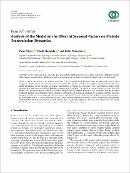Analysis of the model on the effect of seasonal factors on malaria transmission dynamics

View/
Date
202-08Author
Yiga, Victor
Nampala, Hasifa
Tumwiine, Julius
Metadata
Show full item recordAbstract
Malaria is one of the world’s most prevalent epidemics. Current control and eradication efforts are being frustrated by rapid
changes in climatic factors such as temperature and rainfall. This study is aimed at assessing the impact of temperature and
rainfall abundance on the intensity of malaria transmission. A human host-mosquito vector deterministic model which
incorporates temperature and rainfall dependent parameters is formulated. The model is analysed for steady states and their
stability. The basic reproduction number is obtained using the next-generation method. It was established that the mosquito
population depends on a threshold value θ, defined as the number of mosquitoes produced by a female Anopheles mosquito
throughout its lifetime, which is governed by temperature and rainfall. The conditions for the stability of the equilibrium points
are investigated, and it is shown that there exists a unique endemic equilibrium which is locally and globally asymptotically
stable whenever the basic reproduction number exceeds unity. Numerical simulations show that both temperature and rainfall
affect the transmission dynamics of malaria; however, temperature has more influence.
